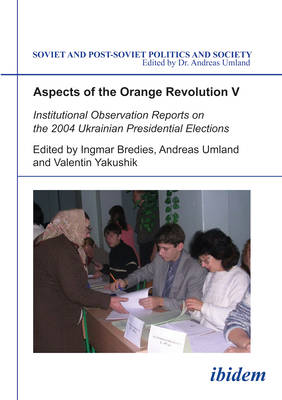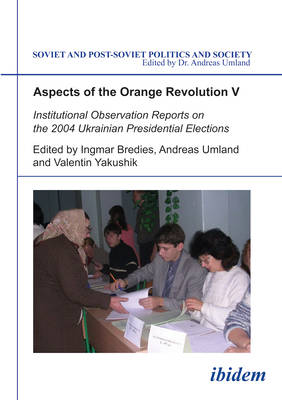
- Retrait gratuit dans votre magasin Club
- 7.000.000 titres dans notre catalogue
- Payer en toute sécurité
- Toujours un magasin près de chez vous
- Retrait gratuit dans votre magasin Club
- 7.000.0000 titres dans notre catalogue
- Payer en toute sécurité
- Toujours un magasin près de chez vous
Aspects of the Orange Revolution V
Institutional Observation Reports on the 2004 Ukrainian Presidential Elections
Andreas Umland, Ingmar Bredies, Valentin Yakushik
36,95 €
+ 73 points
Description
Reports by international governmental and non-governmental organizations on the 2004 presidential elections in Ukraine constituted a significant factor in generating, facilitating, and completing the Orange Revolution. Ukrainian civil society, mass media, courts, and political parties were the main driving force behind the popular uprising that returned Ukraine to the path of democratization it had embarked on in 1991. Yet, the unambiguous stance and political weight of such institutions as the EU, PACE, NATO, and, above all, OSCE played their role too. The democratic movement benefited from the menace of international isolation and stigmatization of the Ukrainian state, which was expected in case President Leonid Kuchma had decided to prevent a repetition of the second round of the voting.The volume collects not all, but some of the most widely discussed reports, including English translations of selected sections of the three reports produced by the CIS International Observers Mission. The latter as well as a report by an Israeli institute depart from the assessments of the other organizations represented here, allowing for comparison of diverging evaluations of the same events. The volume assembles full or excerpted official reports of the International Republican Institute, the Tel Aviv Institute for the Countries of Eastern Europe and CIS, the European Network of Election Monitoring Organizations, the Parliamentary Assembly of the Council of Europe, the Organization for Security and Cooperation in Europe, the Office for Democratic Institutions and Human Rights, and the Commonwealth of Independent States. Contributions by Yevgen Shapoval and Roman Kupchinsky introduce and conclude the collection.
Spécifications
Parties prenantes
- Auteur(s) :
- Editeur:
Contenu
- Nombre de pages :
- 242
- Langue:
- Anglais
- Collection :
- Tome:
- n° 67
Caractéristiques
- EAN:
- 9783898218092
- Date de parution :
- 22-11-07
- Format:
- Livre broché
- Format numérique:
- Trade paperback (VS)
- Dimensions :
- 148 mm x 210 mm
- Poids :
- 290 g

Les avis
Nous publions uniquement les avis qui respectent les conditions requises. Consultez nos conditions pour les avis.






